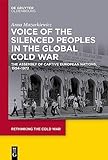Voice of the Silenced Peoples in the Global Cold War : The Assembly of Captive European Nations, 1954-1972 / Anna Mazurkiewicz.
Material type: TextSeries: Rethinking the Cold War ; 8Publisher: München ; Wien : De Gruyter Oldenbourg, [2020]Copyright date: ©2021Description: 1 online resource (XVII, 446 p.)Content type:
TextSeries: Rethinking the Cold War ; 8Publisher: München ; Wien : De Gruyter Oldenbourg, [2020]Copyright date: ©2021Description: 1 online resource (XVII, 446 p.)Content type: - 9783110657050
- 9783110657180
- 9783110661002
- online - DeGruyter
- Issued also in print.
| Item type | Current library | Call number | URL | Status | Notes | Barcode | |
|---|---|---|---|---|---|---|---|
 eBook
eBook
|
Biblioteca "Angelicum" Pont. Univ. S.Tommaso d'Aquino Nuvola online | online - DeGruyter (Browse shelf(Opens below)) | Online access | Not for loan (Accesso limitato) | Accesso per gli utenti autorizzati / Access for authorized users | (dgr)9783110661002 |
Browsing Biblioteca "Angelicum" Pont. Univ. S.Tommaso d'Aquino shelves, Shelving location: Nuvola online Close shelf browser (Hides shelf browser)
Frontmatter -- Contents -- List of Charts and Tables -- Abbreviations -- Preface -- Introduction -- 1 “For Europe Whole and Free” – ACEN Within the Organizational Framework -- 2 “Voice of the Silenced Peoples” – ACEN and the Council of Europe -- 3 “Free Elections and Withdrawal of Soviet Troops” – ACEN and the Communist Regimes -- 4 The “Little U.N.” – ACEN and the United Nations -- 5 “Captive Nations” – ACEN and the U.S. Congress -- 6 “Asian People’s Freedom Day” – ACEN and the APACL -- 7 “Naciones Cautivas Europeas” – ACEN in Latin America -- 8 “We can only buy their time …” – Free Europe Committee and ACEN -- 9 Conclusion, or what was ACEN? -- 10 Epilogue -- Appendices -- Bibliography -- Subject Index
restricted access online access with authorization star
http://purl.org/coar/access_right/c_16ec
According to its members, exiled political leaders from nine east European countries, the ACEN was an umbrella organization—a quasi-East European parliament in exile—composed of formerly prominent statesmen who strove to maintain the case of liberation of Eastern Europe from the Soviet yoke on the agenda of international relations.Founded by the Free Europe Committee, from 1954 to 1971 the ACEN tried to lobby for Eastern European interests on the U.S. political scene, in the United Nations and the Council of Europe. Furthermore, its activities can be traced to Latin America, Asia and the Middle East. However, since it was founded and sponsored by the Free Europe Committee (most commonly recognized as the sponsor of the Radio Free Europe), the ACEN operations were obviously influenced and monitored by the Americans (CIA, Department of State).This book argues that despite the émigré leadership's self-restraint in expressing criticism of the U.S. foreign policy, the ACEN was vulnerable to, and eventually fell victim of, the changes in the American Cold War policies. Notwithstanding the termination of Free Europe’s support, ACEN members reconstituted their operations in 1972 and continued their actions until 1989. Based on a through archival research (twenty different archives in the U.S. and Europe, interviews, published documents, memoirs, press) this book is a first complete story of an organization that is quite often mentioned in publications related to the operations of the Free Europe Committee but hardly ever thoroughly studied.
Issued also in print.
Mode of access: Internet via World Wide Web.
In English.
Description based on online resource; title from PDF title page (publisher's Web site, viewed 28. Feb 2023)









